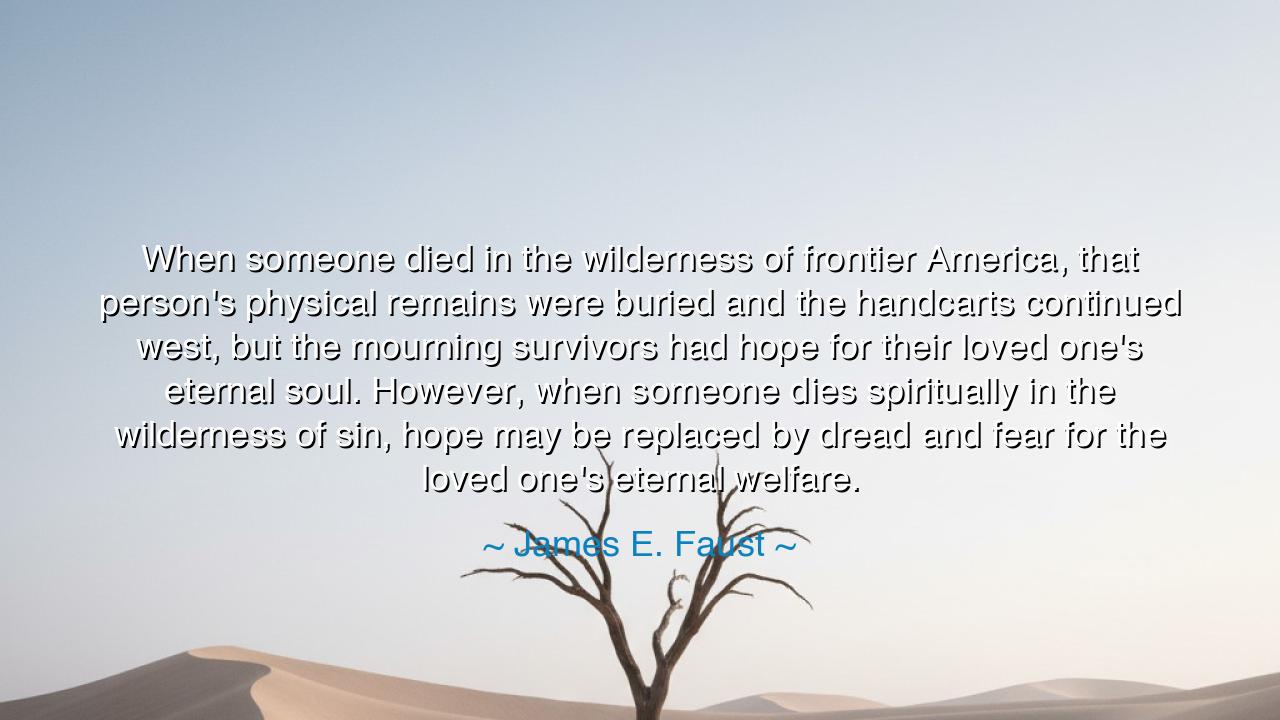
When someone died in the wilderness of frontier America, that
When someone died in the wilderness of frontier America, that person's physical remains were buried and the handcarts continued west, but the mourning survivors had hope for their loved one's eternal soul. However, when someone dies spiritually in the wilderness of sin, hope may be replaced by dread and fear for the loved one's eternal welfare.






James E. Faust once wrote: “When someone died in the wilderness of frontier America, that person's physical remains were buried and the handcarts continued west, but the mourning survivors had hope for their loved one's eternal soul. However, when someone dies spiritually in the wilderness of sin, hope may be replaced by dread and fear for the loved one's eternal welfare.” These words, spoken with the wisdom of one who understood both suffering and faith, are more than a reflection on history — they are a parable for all generations. Faust, a man of deep spiritual insight and reverence, uses the image of the frontier pioneers to reveal a universal truth: that while physical death is sorrowful yet inevitable, spiritual death is a far graver tragedy, for it extinguishes the light that guides the soul toward eternity.
The origin of this thought lies in the sacred story of the early American pioneers, particularly the faithful who crossed the vast plains and deserts in search of freedom and faith. Their journey was marked by hardship — hunger, cold, disease, and death. When a traveler fell, the handcarts did not stop for long; the living had to move on, driven by purpose and belief in a greater promise. Yet their grief was tempered by hope, for they trusted that death was not the end — that the spirit of their beloved had gone home to God. Their sorrow was mingled with faith, for they mourned not as those without hope. The grave, to them, was but a temporary rest, a pause before eternal reunion.
But Faust turns the metaphor inward — to the wilderness of sin, where no handcart travels, and where the journey is not of the body but of the soul. To die spiritually, he warns, is to lose one’s direction in the wilderness of life. It is a death more dreadful than the grave, for while the physical body may perish in nature’s course, the spiritual death comes from willful separation from the divine — from light, truth, and goodness. When one turns away from God, when conscience is silenced and compassion withers, that person walks into a wilderness far darker than the plains of the pioneers. The heart becomes barren, and the soul, though living, begins to die.
Consider the ancient story of King Saul from the scriptures. Once chosen and anointed by God, Saul’s heart was noble and his purpose pure. Yet pride and envy consumed him, and he turned from the path of righteousness. Though his body lived and his throne remained, his spirit decayed. The man who once spoke with prophets now sought the counsel of darkness. In his spiritual death, Saul became a shell of what he had been — tormented by dread, stripped of peace. He is the very image of Faust’s warning: that the death of the soul brings no peace, no hope, only the fear of eternal separation from truth.
Yet Faust’s words are not only a warning; they are also a message of redemption. For just as the pioneers pressed westward through hardship, so too can the soul rise again and journey back toward the light. The wilderness of sin is not without a path of return. Repentance, humility, and faith are the handcarts of the spirit — vehicles that move the weary traveler toward renewal and grace. Even when the soul seems lost, God calls from beyond the horizon, urging it to stand, to walk, to hope once more. The difference between despair and salvation is not circumstance but choice — the choice to seek life over death, truth over darkness, and love over shame.
In these words of Faust, there is also a profound lesson about hope. The pioneers who buried their dead did not give in to despair because they believed in a greater purpose beyond the grave. Likewise, we must not surrender when faced with those who have fallen into spiritual wilderness. The true test of love is to continue believing, to continue praying, to continue hoping even when hope seems gone. Just as the pioneers carried on, trusting in divine mercy, we too must carry on — not abandoning the lost, but guiding them, patiently and faithfully, toward the light once more.
Let this then be the teaching: Do not fear the death of the body, for it is but a passage, but guard the life of the spirit with all your strength. Nourish it with faith, humility, and love. When you see others wander into the wilderness of sin, do not condemn them — reach out your hand. Speak truth. Offer compassion. Pray for them. For the wilderness is vast, but the road home is never closed. And if you yourself should stumble into that desolation, remember — the same God who watched over the pioneers watches over you.
In the end, James E. Faust’s words call us to live with eternal perspective — to remember that life’s greatest treasure is not survival, but salvation. Bodies perish; souls endure. To die in the wilderness is tragic, but to die in the spirit is far worse, unless we rise again through grace. So walk forward, as the pioneers did — through trial and loss, through darkness and light — always with hope for the soul, yours and others’. For where hope lives, no wilderness is truly lost, and no death is ever final.






AAdministratorAdministrator
Welcome, honored guests. Please leave a comment, we will respond soon